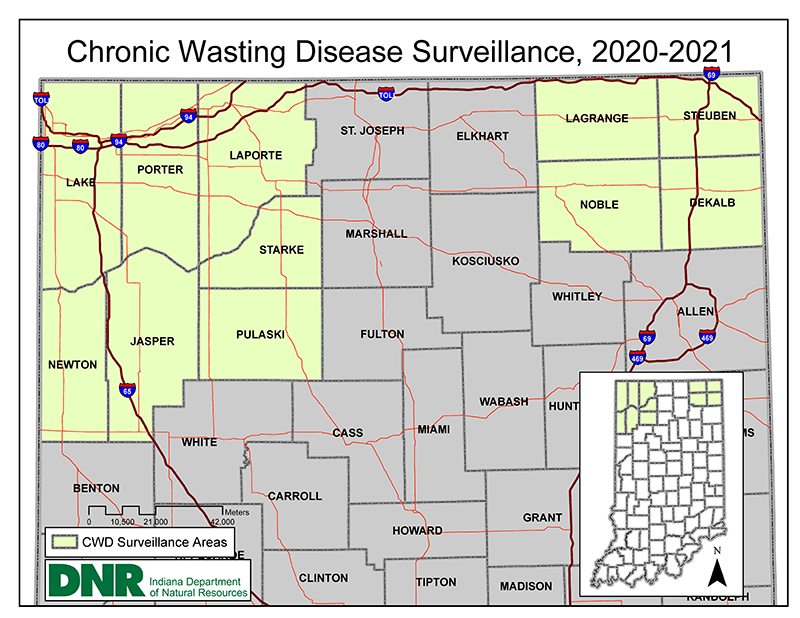Main Content
Article
Chronic Wasting Disease (CWD)
Chronic wasting disease (CWD) is a serious neurological disease affecting white-tailed deer, mule deer, elk, and moose. It is a member of a group of diseases called transmissible spongiform encephalopathies (TSEs), or prion diseases. CWD is fatal in these species. CWD is spread through bodily fluids like feces, saliva, blood or urine and is transmitted either through direct contact or indirectly through environmental contamination of soil, plants, food or water. CWD is similar to mad cow disease in cattle and scrapie in sheep.
Although it has been associated with captive deer and elk in the past, CWD is also found in free-ranging white-tailed deer in several Midwestern states close to Indiana, including Michigan, Illinois, Ohio and Wisconsin.
Each year, Indiana DNR staff collect tissue samples from wild deer (hunter-harvested or reported sick/dead) for CWD testing. Samples are collected from across the state to monitor the presence of CWD in Indiana. To date, CWD has not been detected in deer tested from Indiana.
Learn more about Indiana’s CWD surveillance history in the annual Indiana White-tailed Deer Report.
2020-2021 CWD Surveillance
Indiana DNR is conducting targeted CWD surveillance in northwest and northeast Indiana during the 2020-2021 deer hunting season. The DNR requests voluntary assistance from hunters in this effort. Participants will receive a metal tag reminiscent of historic confirmation tags as tokens of appreciation.
Biologists are collecting samples (lymph nodes at the junction of the head and neck) from deer harvested within the surveillance area during three weekends:
- Nov. 7 and 8, 2020
- Nov. 14 and 15, 2020
- Nov. 21 and 22, 2020
No fee will be charged for CWD testing of deer from these areas through this program.
Hunters may also drop off deer heads for testing at participating fish & wildlife areas (FWA) or state fish hatcheries (SFH) throughout the season. For a complete list of locations and hours of operation, please view the interactive map and list of properties below. Test results, when available, will be posted online for individual hunters to access.
Surveillance Areas

Northwest Indiana
- Jasper County
- Lake County
- LaPorte County
- Newton County
- Porter County
- Pulaski County
- Starke County
Northeast Indiana
- Dekalb County
- LaGrange County
- Noble County
- Steuben County
Sampling Locations
Sampling at Fish & Wildlife Areas and State Fish Hatcheries
Hunters may voluntarily submit samples for CWD testing at FWAs and SFHs throughout the season. During normal business hours, by appointment, a biologist may collect the sample while the hunter waits. After hours, hunters may drop-off deer heads for testing in coolers outside select FWA or SFH offices. Use the search to find a nearby property.
Partnering Businesses
DNR will reach out to processors to determine if they would be interested in participating in this CWD sampling effort. If your business would like to partner with DNR to collect CWD samples, and you are located in the surveillance areas, please call 844-803-0002.
Carcass Transportation
Out-of-state deer hunters should follow carcass transportation regulations for their home state as well as carcass transportation regulations for the state in which they are hunting.
Import restrictions governing carcasses in Indiana
Human health
According to the Centers for Disease Control and Prevention , “there have been no reported cases of CWD infection in people. However, animal studies suggest CWD poses a risk to some types of non-human primates, like monkeys, that eat meat from CWD-infected animals .”
The CDC further states that “These studies raise concerns that there may also be a risk to people. Since 1997, the World Health Organization has recommended that it is important to keep the agents of all known prion diseases from entering the human food chain.”
Testing is not required in Indiana at this time, but in areas where CWD is known to be present, the CDC recommends that hunters strongly consider having deer and elk tested before eating the meat. The CDC recommends that you do not eat meat from an animal that tests positive for CWD.
For more information about precautions you can take to decrease the risk of exposure to CWD, visit the CDC webpage at www.cdc.gov/prions/cwd/prevention.html.
For questions related to human health, you may also contact the Indiana State Department of Health at 317-233-1325.
More information
If you have any questions regarding CWD or other diseases in wild deer, contact the Indiana Department of Natural Resources, Division of Fish & Wildlife at 844-803-0002.
FAQs about CWD
- What are the signs of CWD?
- Why is DNR testing for CWD?
- How are deer tested for CWD?
- Will I be notified of my deer’s CWD test results?
- Where can hunters have deer tested?
- Am I required to turn over a sample of my deer?
- How can I tell if the deer I harvested has CWD?
- Are there other options to get deer tested for CWD?
